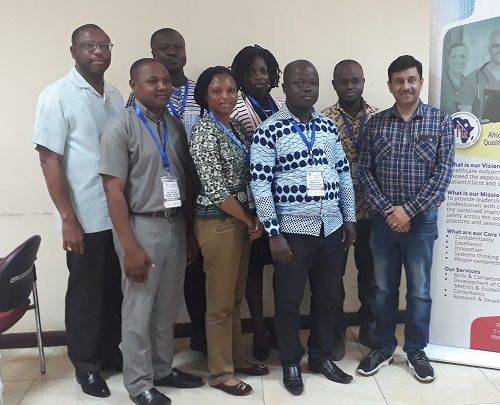
A Public Health Physician, Dr Gilbert Buckle, has stressed the need to improve the quality of personnel working in private and public medical laboratories in the country.
According to him, there were not enough internationally certified Medical Laboratory practitioners, hence the need to enhance the technical capacity of laboratory staff to meet international standards.
He said professionals must continue to upgrade their skills and remain courteous, as they followed accepted standards in dealing with clients.
Dr. Buckle, who was speaking on the sidelines of a workshop for some Medical Laboratory practitioners in Accra, noted that Medical Laboratory practice appeared cumbersome, hence practitioners must ensure “that things were done right.”
The one-week intensive programme, which ended last Friday, was organised by the Africa Institute of Healthcare Quality Safety Accreditation (AfiHQSA) in collaboration with the Quality Accreditation Institute (QAI), India.
Dubbed: “Medical Laboratory Quality Manager Training”, the session, among other objectives, was to help practitioners understand the fundamentals of health care quality and safety, and how to conduct medical laboratory assessment.
It also sought to certify Medical Laboratory Safety Managers for the country, and the professionals appreciate their role in the “advancement of patient safety through medical diagnostics.”
Dr Buckle, also the Executive Director of (AfiHQSA) said the course, the first of its kind, was certified by the Allied Health Professionals Council, and was expected to run at least twice a year.
He said that the course, which was aligned to the International Organisation for Standardization (ISO) guidelines, would be made more accessible as they considered holding subsequent editions in the northern sector of the country.
“There is no training programme in the country that builds the capacity of laboratory technicians and technologists to be able to ensure quality in the work they do, hence the need for such workshops.” he noted.
“We are influencing their attitude and mindset to ensure that things are not done as usual. We are supporting them to become more aware and hold themselves more accountable,” he added.
Dr Buckle explained that trainees would have six weeks to audit their own laboratories as the organisation gave technical support to help correct any lapses spotted.
The Executive Director expressed the AfiHQSA’s commitment to partner public and private hospitals towards improving laboratory services in the country.
Dr. Bhupendra Kumar Rana, Founding CEO, Quality Accreditation Institute, India, noted that medical laboratories were crucial in the health care process, hence the need for practitioners to ensure that their test results were accurate “to enable patients receive the correct treatment.”
He urged health regulatory bodies to increase collaboration with various partners to raise the standard of medical laboratory practice in the public and private sector.
The first batch of trainees, who came from the Bank of Ghana Clinic, Ho Teaching Hospital, The Trust Hospital, St Patrick’s Hospital, Offinso, and the 37 Military Hospital, were awarded certificates.
By Ernest Nutsugah







